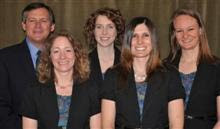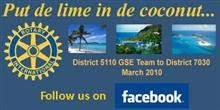.jpg) St. Luke's Catholic School, Pointe Michel, Dominica
St. Luke's Catholic School, Pointe Michel, Dominica Students at St. Luke's Catholic School
Students at St. Luke's Catholic SchoolThe education system in Dominica is much different than what we have in the United States. Of course, Dominica is a much smaller and more homogeneous country than the United States, which generally makes things easier. According to the last census (2001), the population is 87 percent black, nine percent mixed race, and three percent Carib Amerindian, with smaller numbers of other groups - whites number only about 0.6 percent of the population. In addition, the country is over 60 percent Roman Catholic.
In general, students are expected to attend the school that is nearest their homes. That school may be a government school or a religious school - there is no cost in any case for students from age 6 to 19. All religious and government schools are supported by taxes - the church provides venue and the staff for its schools, but the expenses - including teacher salaries - is funded by the government. All students wear uniforms to school.
 Government school in the capital Roseau
Government school in the capital RoseauPre-school is not funded by the government. If a parent wishes to send their children to pre-school, they are responsible for the expense involved. Once the student begins elementary school, the education is paid for by the government, much like in the United States.
Unlike the United States, however, junior college is funded by the government. There are no four-year universities on Dominica*; after completing junior college, student can transfer to a school in another country - usually in the Caribbean, Canada or the United States. Students may qualify for government scholarships to continue their education abroad. There are also private and university scholarships, as anywhere else.
As you might imagine, the use of religious (predominantly Roman Catholic) schools causes a bit of controversy. Some parents are pleased with the education provided by the church schools - it is regarded as superior to that provided in the government schools, but do not want their children taught about a particular religion. Parents of students assigned to a Catholic school must sign an agreement that their children will receive religious instruction.
If the parents refuse to sign the agreement, they have two options. They can place their child in a government school, but they are responsible for transporting the student to wherever that government school is located. They can also place the child in a private commercial school that is not under the management of the government or the church - at their own expense. Of course, for many parents, neither are realistic options.
_________
* There are two American-owned and operated medical schools on Dominica, but they are not part of the domestic education system. The schools are Ross University Medical School in Portsmouth and All Saints University Medical School in Roseau.
Rick Francona
Unlike the United States, however, junior college is funded by the government. There are no four-year universities on Dominica*; after completing junior college, student can transfer to a school in another country - usually in the Caribbean, Canada or the United States. Students may qualify for government scholarships to continue their education abroad. There are also private and university scholarships, as anywhere else.
As you might imagine, the use of religious (predominantly Roman Catholic) schools causes a bit of controversy. Some parents are pleased with the education provided by the church schools - it is regarded as superior to that provided in the government schools, but do not want their children taught about a particular religion. Parents of students assigned to a Catholic school must sign an agreement that their children will receive religious instruction.
If the parents refuse to sign the agreement, they have two options. They can place their child in a government school, but they are responsible for transporting the student to wherever that government school is located. They can also place the child in a private commercial school that is not under the management of the government or the church - at their own expense. Of course, for many parents, neither are realistic options.
_________
* There are two American-owned and operated medical schools on Dominica, but they are not part of the domestic education system. The schools are Ross University Medical School in Portsmouth and All Saints University Medical School in Roseau.
Rick Francona

.jpg)

.jpg)
Hi, This is from the staff of Pellitier & Pellitier. We are all following along on your trip and enjoying the pictures. A special shout out to Heidi from the home team! We miss you!
ReplyDeleteMichelle, John, Nathan and Zoe!
Yay! thanks guys. it's too much fun here! i mean... it's very educational and a professional learning experience. ;)
ReplyDelete